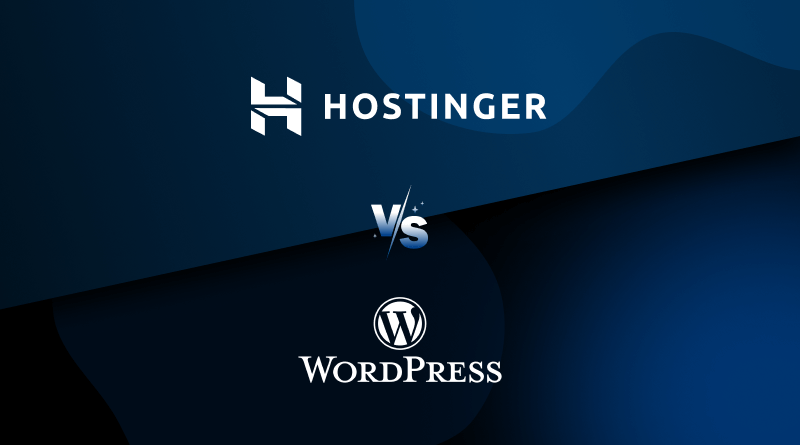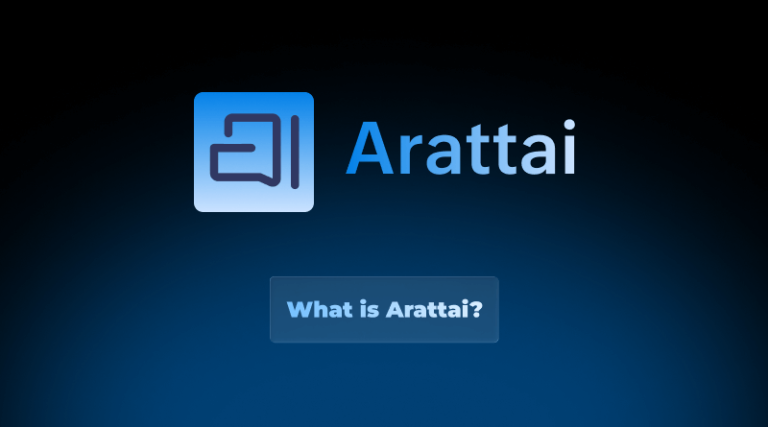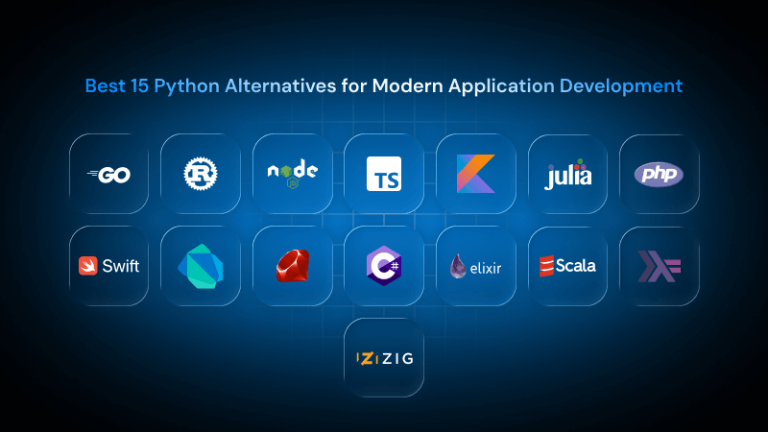As technology continues to evolve at a rapid rate, building a brand-new website is easier than ever. When comparing WordPress vs Hostinger, users often look for ease of use, flexibility, and how quickly a website can be launched without technical barriers. Thanks to the introduction of numerous platforms, businesses can quickly develop websites with higher functionalities. However, when it comes to selecting the ideal platform, it may feel overwhelming. When discussing the top website builders, Hostinger vs WordPress is the most compared globally.
Hostinger offers an easy and accessible complete hosting package that includes a website builder, perfect for anyone looking to get online quickly and cheaply. This makes it an appealing option for beginners or those looking for a cost-effective way to set up a site without unnecessary features. WordPress is a powerful (and general-use) content management platform that you can use on its own or have built out. It offers flexibility and future-proofing for moderate to advanced users. WordPress hosts a wide range of plugins and themes to provide options for those MVPs and brands who want control over design, features, and future usability.
In this review, you will look at the comparative features and functionalities of Hostinger vs WordPress in areas like pricing, ease of use, design, SEO, blogging features, and business features, and you should be able to discern which platform is better aligned with your needs for 2026 whether you are setting up your first site, blog, or trying to set up a full-branded website.
Table Of Content
What is Hostinger?
Hostinger is a global web hosting company that has witnessed significant growth and success in recent years. Offering a variety of options, Hostinger is most commonly known for its low-cost plans, including shared hosting, VPS, cloud hosting, and dedicated WordPress hosting packages.
What makes Hostinger truly special is its simplicity. Whether you’re a beginner or a small business that just needs a simple online presence, Hostinger is a great place to start. With its AI website builder, you can access drag-and-drop functionality that helps enhance the aesthetic of your website design and build a professional-looking website.
What is WordPress?
WordPress is an open-source content management system (CMS) that accounts for over 40% of the websites on the internet today. In a WordPress.com vs Hostinger comparison, the biggest differences lie in pricing structure, hosting control, and customization limitations. WordPress differs from Hostinger in that, while Hostinger offers hosting and a builder, WordPress acts more like the service you’re using to build the site, publish it, and manage its contents and configurations.
WordPress has:
- WordPress.org (self-hosted): Free to use if you find a hosting service (like Hostinger) and a domain name.
- WordPress.com (hosted): This comes with the hosting, but advanced features require a paid plan.
In comparison, Hostinger WordPress hosting vs WordPress.com, it’s about using a low-cost hosting solution with WordPress.org versus paying for the convenience of hosting WordPress.com.
If you’re a blogger, business, or just want to be able to manage considerable customization and scalability, then WordPress will absolutely serve your needs.
Hostinger vs WordPress Pricing
Hostinger Pricing:
- Premium plans offer a free SSL certificate, a free domain for the first year, and include the Hostinger site builder.
- The company even offers cheap WordPress hosting plans that come with speed and security.
- Shared hosting plans at Hostinger start at about $2 to $3 per month.
WordPress Pricing:
- With self-hosted WordPress.org, you’ll need to pay for hosting.
- Premium themes and plugins also present additional expenses. However, you have options to use the free version.
- The pricing for WordPress.com starts at $4 per month for basic plans and increases to $25+ for business plans.
The Bottom Line on Pricing:
When conducting pricing comparisons of Hostinger vs WordPress, Hostinger comes out on top for affordability, especially since it includes hosting, domain, and builder in the plan. This hostinger alternative can be a more affordable option, particularly if you use free plugins/themes.
Hostinger vs WordPress Ease of Use
Hostinger Usability:
- Hostinger’s hPanel (their control panel) is clean and easy to use for beginners.
- With Hostinger’s website builder, you can build a website in just a few hours using their drag-and-drop tools.
- With Hostinger, you can install WordPress with just one click.
WordPress Usability:
- WordPress has a higher learning curve.
- It may be overwhelming for beginners due to its dashboard and theme setup, and the WordPress plugins can also be overwhelming.
- However, if you get used to it, WordPress is more powerful than the Hostinger website builder.
The Bottom Line on Usability:
In the battle of Hostinger vs WordPress usability, Hostinger is easier for beginners. WordPress takes time to learn, but it will be worth it if you’re looking for more advanced options.
Hostinger vs WordPress Website Builder
Both platforms offer ways to create websites, but they approach it differently. In the WordPress vs Hostinger website builder comparison, flexibility, customization depth, and long-term scalability remain the most noticeable differences.
Hostinger Website Builder:
- Drag-and-drop editing. AI tools are generating layouts. Ideal for smaller, simpler websites.
- Pre-configured mobile-friendly templates for polished look and fast loading speeds.
WordPress Website Builder:
- WordPress is a content management system, not a builder. However, if you were to use a tool such as Elementor or Divi, or the Gutenberg editor that comes standard with WordPress, it would be the most flexible builder you will find.
- You can build an entire e-commerce store or a personal blog; the possibilities are endless.
The Bottom Line on Usability: Website Builder:
If you are looking for something easy to use, an ideal option is to opt for Hostinger. If you want complete control over your website, the Hostinger vs WordPress website builder comparison makes it obvious that WordPress is much more flexible.
Hostinger vs WordPress: The Beginners’ View
When you’re building your first website, here’s what you need to know:
Hostinger for Beginners:
- Simple setup with a one-click WordPress installation.
- An AI-based website builder that doesn’t require any coding.
- Cheap and has some bundled features.
WordPress for Beginners:
- More complicated to initially set.
- Learning about plugins, themes, and hosting will be required.
- But once you learn it, the possibilities are limitless.
Final Verdict:
In Hostinger vs WordPress for beginners, Hostinger will be simpler, but WordPress will be better for growing.
Blogging with Hostinger and WordPress
Blogging is one of the top reasons to use either service.
Hostinger Blogging:
- Of course, you could blog with the website builder, but many blogging features are missing.
- A better approach would be to get Hostinger WordPress hosting. That way, you can get all of Hostinger’s speed and all of the WordPress blogging features.
WordPress Blogging:
- WordPress is a popular blogging platform.
- There is a built-in post editor, post tags, categories, scheduling, and plugins like Yoast SEO that will help you do anything you want as a blogger.
Verdict:
WordPress is the better choice for serious bloggers. A comparison of Hostinger vs WordPress for blogging shows that CMS continues to be the best option.
Hostinger and WordPress for Business Website
Hostinger for Business Websites:
- Hassle-free setup with templates.
- Ideal for small businesses while on a tight budget.
- E-commerce use is possible, but it comes with limited features compared to WordPress.
WordPress for Business Websites:
- Ticks all the boxes for business, small, startup, and large-scale enterprise.
- Access to thousands of themes and plugins to facilitate e-commerce, booking systems, memberships, etc.
- Scales with your company.
Final Verdict:
In the case of Hostinger vs WordPress for business websites, Hostinger is ideal for small businesses; WordPress offers easier, better, and more sustainable functionality in the long run.
Hostinger or WordPress SEO
Hostinger SEO:
- The website builder saves you time by managing basic SEO tasks such as title tags and sitemaps.
- If you decide to subscribe to Hostinger WordPress hosting, WordPress itself offers a wide range of SEO plugins that include more advanced and lightweight features, including Rank Math or Yoast.
WordPress SEO:
- WordPress extends control of SEO with the use of plugins.
- Control over your URLs, schema markup, and advanced caching tools are examples of more advanced SEO control that many WordPress plugins offer.
- This also gives you full control of any optimization strategies.
Final Verdict:
Although when discussing Hostinger vs WordPress SEO, WordPress provides more advanced options, Hostinger does offer a basic starting point.
Hostinger vs. WordPress Performance
When performing a head-to-head comparison of Hostinger and WordPress hosting, one additional consideration is website performance (speed and reliability).
- Hostinger Performance:
- Hostinger’s web hosting infrastructure is built using high-end server technology that many large businesses utilize and rely on.
- Additionally, its website builder helps with lightweight development tools, eventually leading to fast-loading websites.
- Hostinger offers performance enhancements for your server response times and increased uptime reliability.
- WordPress Performance:
- WordPress offers optimized hosting, caching plugins, and lightweight themes.
- WordPress sites perform well with high speeds and excellent stability.
- However, it limits the use of plugins. Too many can ruin your website performance.
The Bottom Line on Performance:
Hostinger offers consistent performance at its base level with minimal management. WordPress has higher potential performance but requires diligent optimization and maintenance to maximize the performance.
Hostinger vs WordPress Safety
Another important consideration for comparison between Hostinger and WordPress is safety.
- Hostinger Safety:
- Hostinger provides built-in safety features (including free SSL certificates, automatic backups on selected plans, malware scanning, DDoS attack protection, and secure account access) through hPanel.
- Additionally, Hostinger handles many of the major safety measures on the server level, thus minimizing user configuration risks.
- WordPress Safety:
- While WordPress has safety built into it, your website’s security depends directly on your actions.
- As a web owner, you must follow best practices regarding updates, have a trusted plugin repository, use secure themes, and utilize security plugins (e.g., Sucuri, Wordfence).
- While this offers greater control for the user, it also increases the risks for vulnerabilities when best practices and timely updates are not followed.
Verdict:
Hostinger offers better default security for beginners. WordPress provides stronger security flexibility but requires ongoing maintenance and technical awareness.
Which One Is Better: Hostinger or WordPress?
When deciding between Hostinger or WordPress hosting, consider how you’d like your website to achieve control, flexibility, and performance over time.
Hostinger is great if you are looking for a quick, affordable way to get your site online. You can access all of the resources needed to build and launch your site (hosting, website builder, domain name, SSL certificate, and basic performance optimization) in one easy-to-use package. Because of this holistic setup, Hostinger is perfect for beginners, freelancers, or small businesses that want to create a functional site without worrying about complicated technical aspects of web development.
On the flip side, WordPress is much more technically involved and requires its own dedicated hosting account. While this hosting requirement increases the barriers, it provides users with greater control over their sites through enhanced customization, scalability, and access to thousands of plugins and themes.
Verdict:
For a website that needs to be created quickly and cheaply, Hostinger is the best option. Ensure you check their renewal costs, which increase dramatically after the promotional period.
So what should you choose in 2026? Choose Hostinger if you are a novice looking to get a website started quickly and cheaply. Choose WordPress if you are looking for full customization, scalability, and sophisticated SEO for blog and business websites.
For many first-time site owners, the WordPress vs Hostinger debate comes down to whether they prefer an all-in-one solution or a platform that allows deeper customization and long-term scalability. The best option is a hybrid: Hostinger’s WordPress hosting vs WordPress.com. This way, you receive the speed and low cost of Hostinger hosting plus unrivaled WordPress flexibility.
FAQs
1. Which is easier for beginners to use: Hostinger or WordPress?
When comparing ease of use for beginners, Hostinger is simpler for new users to operate on, thanks to its drag-and-drop builder. WordPress has a learning curve, but it provides you with more control.
2. What is the difference between a Hostinger vs WordPress website builder?
The difference lies in the functionalities of an easy website builder. Hostinger has a fast AI-powered drag-and-drop builder, while WordPress offers much more flexibility with unlimited options of themes and plugins.
3. Are free domains included with Hostinger and WordPress?
Yes, with several Hostinger plans, there is a free domain for the first year. WordPress.com offers a free domain with premium plans, but WordPress.org requires a subscription.
4. Which builder has more design flexibility and customization?
Out of the two, WordPress is better for customization owing to its thousands of themes and plugins. On the other hand, Hostinger often has limitations that limit your advanced operations.














